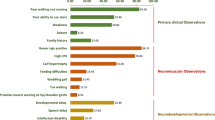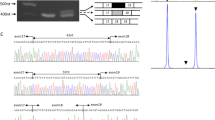Abstract
Duchenne muscular dystrophy (DMD) is a severe X-linked neuromuscular disease with an incidence of ∼1 in 3,500 newborn boys. The DMD locus has a high mutation frequency: one third of the cases is thought to result from a new mutation1. Linkage studies using probes to detect restriction fragment length polymorphisms2 and DNA deletion studies3 have greatly improved DMD carrier detection and prenatal diagnosis4,5. Here we report on two families in which a pERT87 (DXS164) deletion3,6 was transmitted to more than one offspring by women who showed no evidence for the mutation in their own somatic (white blood) cells. We also show that the deletion in both siblings in one of the families is identical, indicating that the deletion must have occurred during mitosis in early germline proliferation, leading to a germline mosaicism. This phenomenon may turn out to be a major factor contributing to the induction of DMD mutations, and has important implications for the counselling of DMD families.
This is a preview of subscription content, access via your institution
Access options
Subscribe to this journal
Receive 51 print issues and online access
$199.00 per year
only $3.90 per issue
Buy this article
- Purchase on Springer Link
- Instant access to full article PDF
Prices may be subject to local taxes which are calculated during checkout
Similar content being viewed by others
References
Moser, H. Hum. Genet. 66, 17–40 (1984).
Davies, K. E. et al. Nucleic Acids Res. 11, 2303–2312 (1983).
Kunkel, L. M. et al. Proc. natn. Acad. Sci. U.S.A. 82, 4778–4782 (1985).
Bakker, E. et al. Lancet i, 655–658 (1985).
Bakker, E. et al. J. med. Genet. 23, 573–580 (1986).
Kunkel, L. M. et al. Nature 322, 73–75 (1986).
Monaco, A. P. et al. Hum. Genet. 75, 221–227 (1987).
Ray, P. N. et al. Nature 318, 672–675 (1985).
Romeo, G. et al. Am. J. hum. Genet. 39, 291 (1986).
Koenig, M. et al. Cell 50, 509–517 (1987).
Gitschier, A. J. Am. J. hum. Genet. 39, 593 (1986).
Hanl, D. L. Am. J. hum. Genet. 23, 124–134 (1971).
Murphy, E. A. et al. Am. J. hum. Genet. 26, 207–222 (1974).
Gartler, S. M. & Francke, U. Am. J. hum. Genet. 27, 218–223 (1975).
Francke, U. et al. Am. J. hum. Genet. 28, 123–137 (1976).
Thompson, C. B. & Neiman, P. E. Cell 48, 369–378 (1987).
Herrmann, B. et al. Cell 44, 469–476 (1986).
Lenman, J. T. et al. Am. J. hum. Genet. 41, 138–144 (1987).
Author information
Authors and Affiliations
Rights and permissions
About this article
Cite this article
Bakker, E., Broeckhoven, C., Bonten, E. et al. Germline mosaicism and Duchenne muscular dystrophy mutations. Nature 329, 554–556 (1987). https://doi.org/10.1038/329554a0
Received:
Accepted:
Issue Date:
DOI: https://doi.org/10.1038/329554a0
This article is cited by
-
Revealing parental mosaicism: the hidden answer to the recurrence of apparent de novo variants
Human Genomics (2023)
-
Genetic analysis of 62 Chinese families with Duchenne muscular dystrophy and strategies of prenatal diagnosis in a single center
BMC Medical Genetics (2019)
-
Comparative-high resolution melting: a novel method of simultaneous screening for small mutations and copy number variations
Human Genetics (2014)
-
Improved Detection of Deletions and Duplications in the DMD Gene Using the Multiplex Ligation-Dependent Probe Amplification (MLPA) Method
Biochemical Genetics (2013)
Comments
By submitting a comment you agree to abide by our Terms and Community Guidelines. If you find something abusive or that does not comply with our terms or guidelines please flag it as inappropriate.



